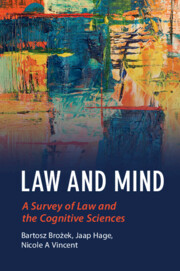Book contents
- Law and Mind
- Law and the Cognitive Sciences
- Law and Mind
- Copyright page
- Contents
- Figures
- Contributors
- Acknowledgements
- 1 Introduction
- I Metatheory and Methodology
- II Ontology and Epistemology
- III Legal Doctrine and Cognitive Sciences
- IV Evidence
- 17 Implications of Neurotechnology: Brain Recording and Intervention
- 18 Neuroimaging Evidence in US Courts
- 19 Neuroscientific Evidence in Context
- 20 Some Issues in Interpreting Neuroscientific Evidence
- 21 Explanation-Based Approaches to Reasoning about Evidence and Proof in Criminal Trials
- V Dissenting Opinions
- References
19 - Neuroscientific Evidence in Context
from IV - Evidence
Published online by Cambridge University Press: 21 April 2021
- Law and Mind
- Law and the Cognitive Sciences
- Law and Mind
- Copyright page
- Contents
- Figures
- Contributors
- Acknowledgements
- 1 Introduction
- I Metatheory and Methodology
- II Ontology and Epistemology
- III Legal Doctrine and Cognitive Sciences
- IV Evidence
- 17 Implications of Neurotechnology: Brain Recording and Intervention
- 18 Neuroimaging Evidence in US Courts
- 19 Neuroscientific Evidence in Context
- 20 Some Issues in Interpreting Neuroscientific Evidence
- 21 Explanation-Based Approaches to Reasoning about Evidence and Proof in Criminal Trials
- V Dissenting Opinions
- References
Summary
In her commentary on Moriarty’s contribution about neuroscientific evidence, Denno examines the scientific environment in which neuroscientific evidence took hold, as well as the complexities that can arise when attempting to decipher the influence of such evidence in the much broader framework of a criminal case that involves hundreds of factors, with neuroimaging tests simply being one component. In this connection, she first discusses the conceptual distance between the evidence that neurosciences can contribute and the legal question that need to be answered. Second, she addresses the historical development of the use of neuroscientific evidence. The comments are concluded by a brief discussion of the different evidentiary standards and their influence on the usability of neuroscientific evidence.
- Type
- Chapter
- Information
- Law and MindA Survey of Law and the Cognitive Sciences, pp. 412 - 420Publisher: Cambridge University PressPrint publication year: 2021

